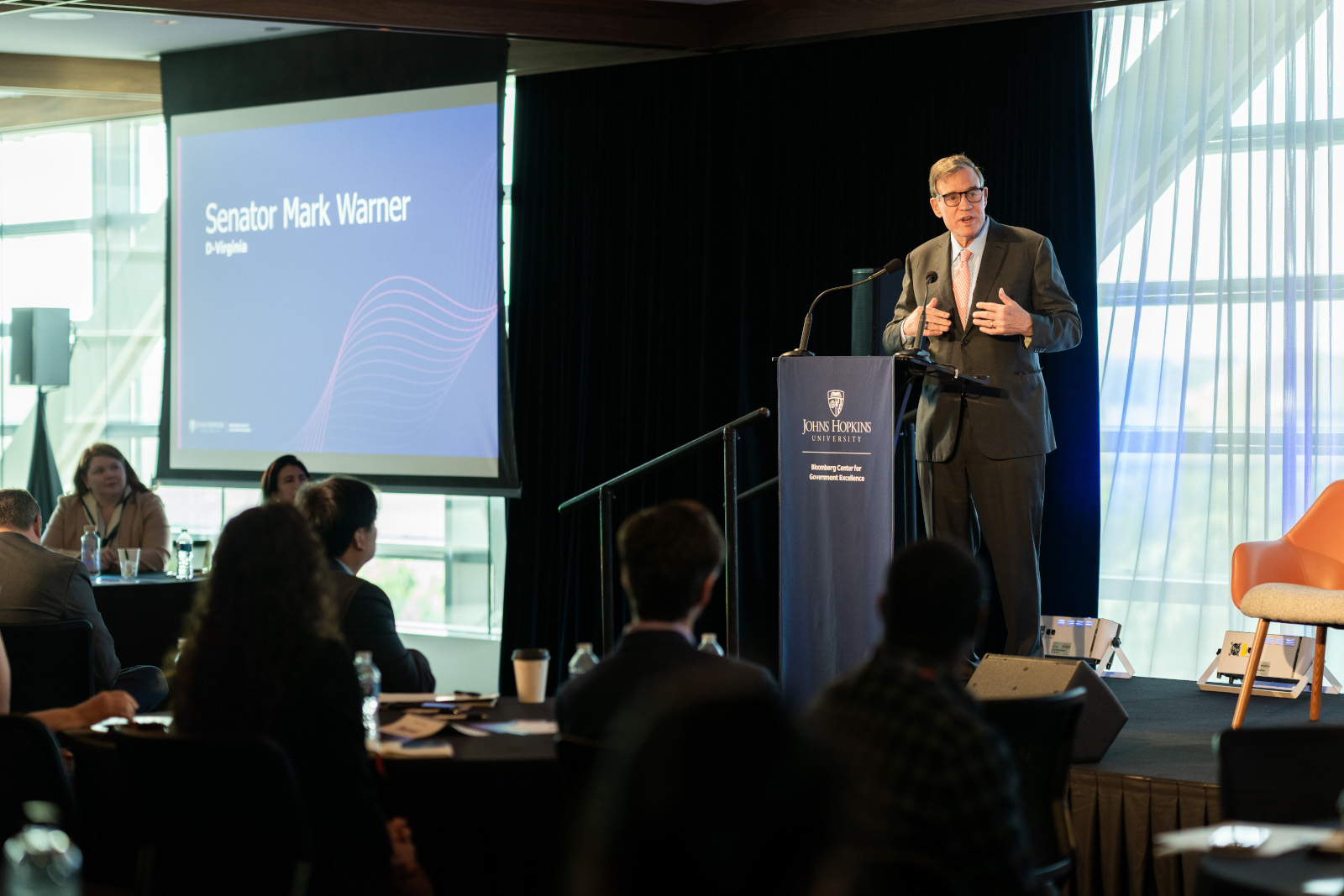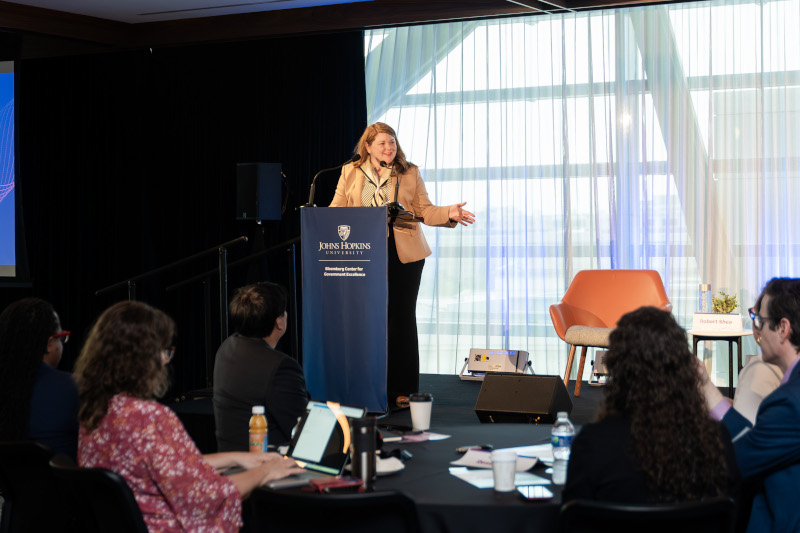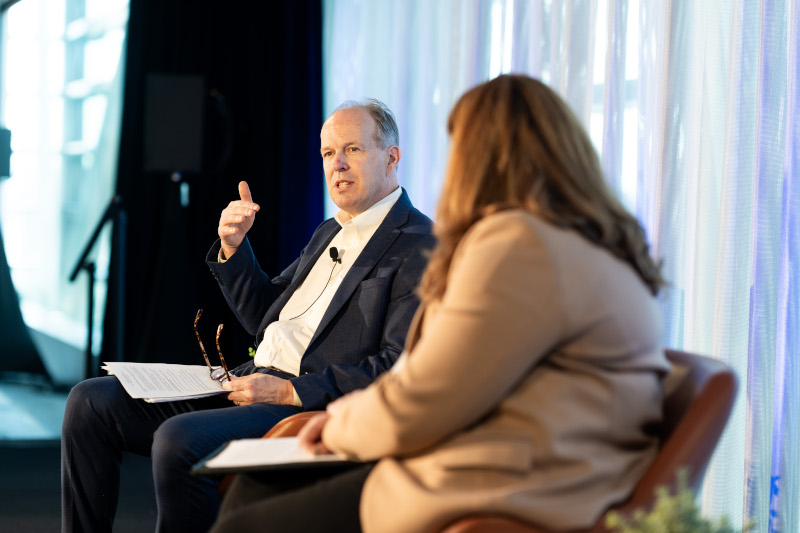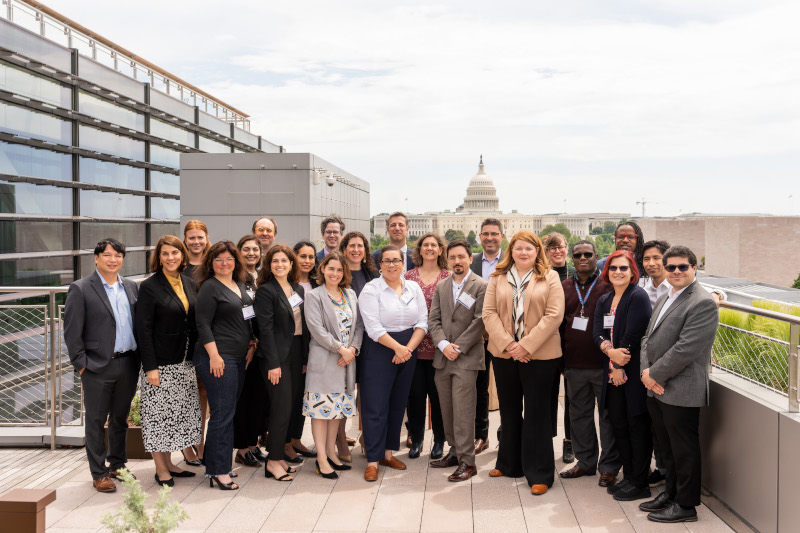Celebrating 10 years of the DATA Act

GovEx gathered more than 100 lawmakers, open data advocates, and local municipal leaders from around the country at the new Johns Hopkins University Bloomberg Center in the heart of Washington, D.C. for the event, “Reflections on the 10th Anniversary of the DATA Act: Examining the Impact and the Future of Open Data.” (Watch the full livestream or a compilation of highlights.)
The DATA Act was the country’s first open data law, standardizing data for more than $6 trillion in annual spending and making it possible for taxpayers to monitor how federal funds are allocated and trace those funds to direct investments in their communities. It became a model for open data laws around the country and around the world.
Senator Mark Warner (D-VA), sponsor of the 2014 law, Mayor Tim Kelly of Chattanooga, and a wide range of federal officials, including several who played key roles in passing and implementing the DATA Act, were among those who spoke at the event, which encouraged attendees to consider the last decade of improved transparency and to look ahead to how the use of public sector data might evolve alongside emerging technologies.
GovEx Executive Director Amy Holmes, who hosted the event, played several key roles in putting the DATA Act in place. Before coming to GovEx, Holmes was Director of the Task Force on Government Performance on the Senate Budget Committee, where she helped draft the DATA Act and get it passed. Then, as a Deputy Assistant Secretary at the US Department of the Treasury, she helped implement it. As Senator Warner said in his remarks at the event, “No one has had more fingers on everything involved [in the DATA Act] than Amy.”
Read about highlights from the event below.
Welcome and Reflections from Leadership
GovEx founder and Johns Hopkins University Associate Vice Provost for Public Innovation, Beth Blauer, and Head of Federal Initiatives, Government Innovation at Bloomberg Philanthropies, Luke McGowan, welcomed the crowd to the Johns Hopkins University Bloomberg Center. Both emphasized the important role data plays in the public sector and driving governments forward.
GovEx Executive Director, Amy Edwards Holmes, recounted her experience working to create, pass, and implement the DATA Act.
“I have watched this DATA Act grow from an idea to a robust movement across the globe, inspiring a new approach for linking financial data and unlocking the power of connected data for public benefit,” Holmes said in her opening remarks.

GovEx Executive Director Amy Edwards Holmes.
Special Guest Speakers

U.S. Sen. Mark Warner (D-VA).
Sen. Mark Warner (D-VA), who sponsored the DATA Act in 2014, noted that before the DATA Act was passed, Americans had no reliable way to track how federal tax dollars were spent.
“We’ve still got work to do, but I don’t think we would be as far along if we hadn’t passed the DATA Act 10 years ago. I hope you’ll continue to look to me and others,” he said. “This is still a broadly, broadly bipartisan subject. The more we can move this along, the more we can have a better informed citizenry, a more efficient use of our taxpayer dollars and, at the end of the day, that means a better community, a better state government, and better federal government.”
Warner continued, noting that applying artificial intelligence to public data could enhance usability and understanding, ultimately transforming how data is applied in the public sector once again.
Following Warner, Chattanooga Mayor Tim Kelly (I) took the stage and emphasized that training government leaders to rely on data rather than instinct takes significant effort and that the federal DATA Act helps advance this cause at all levels of government. Kelly, who worked closely with GovEx coaches and experts as part of the Bloomberg Philanthropies City Data Alliance, calls the journey to routine use of data in government a “cultural revolution.”
“I’m glad this Act was passed 10 years ago because, ladies and gentlemen, as you all know, it is a journey. It is a cultural revolution to try to get people out of their ruts, very frankly, in local government working from instinct and not from the data.”

Chattanooga Mayor Tim Kelly (I).
Panels
The DATA Act celebration also featured several panel discussions with data policy experts and champions of the 2014 law. They included:
Developing the Data Strategy for the First Open Data Law

(L to R) Robert Shea, Christina Ho, Ed Deseve, and Kaitlin Devine.
Moderated by Robert Shea, a former leader at the White House Office of Management and Budget and President of the GovNavigators consulting firm, this group took a look back at the passage of the DATA Act and the effort required to pass such a significant public data law.
Panelists included Ed DeSeve, Former Special Advisor to President Barack Obama, Kaitlin Devine, Chief Data Officer, U.S Department of Health and Human Services Inspector General, and Christina Ho, Board Member, Public Company Accounting Oversight Board.
Ho, who set the vision for the DATA Act implementation as Deputy Assistant Secretary for the Office of Accounting Policy and Financial Transparency at the Treasury department, said the challenge of implementing the law was linking the data of more than 100 federal agencies into a common structure.
“It would be a missed opportunity if the agencies were going to implement the law as a check- the-box exercise,” Ho said. “The first thing we did was articulate the value proposition of the law, which was better data, better decisions, better government and we persuaded the agency that they needed to implement the law … to not just to comply with the law, but to also use it internally to improve their decision making.”
DATA Act Leadership Lessons
Amy Edwards Holmes and David Lebryk, Fiscal Assistant Secretary at the U.S. Department of the Treasury, discussed the challenges of leading widespread change in a large government entity. Lebryk called the implementation of the DATA Act one of the most significant accomplishments of his 35 year career in federal service.
“Anytime that you’re doing a government-wide initiative, it’s going to be bound to be enormously complex. It’s hard to move the largest enterprise in the world to do anything,” Lebryk said. “… You have so many different systems, you have so many different organizational cultures and the like. It’s hard. You have to be very thoughtful.”

(L to R) David Lebryk and Amy Edwards Holmes.

(L to R) Robert Shea, Christina Ho, Ed Deseve, and Kaitlin Devine.
Realizing the Potential: Applying AI to Open Data in Federal and Local Governments
The final panel of the day examined how open data and artificial intelligence might work together in the future. Panelists included Cheriene Floyd, Chief Data Officer, City of Miami, Oliver Wise, Acting Undersecretary for Economic Affairs and Chief Data Officer, U.S. Department of Commerce, Renata Miskell, Deputy Assistant Secretary, Accounting Policy and Financial Transparency, U.S Department of Treasury, and Matt Sokol, Chief Data Officer, Government of the District of Columbia.
Like with many emerging technologies, Wise said the public will come to expect to be able to use AI to accomplish myriad tasks, including accessing public services. To make this happen, governments will need to transition to a framework that allows generative platforms to correctly interpret public data.
“It’s basically like a poke to industry and academia and government people in the space to help us figure out how, if you are innovating with GenAI around open data and public data, what could we do as data publishers to unblock your innovations so that we can better enable more satisfying user experiences around that data,” he said of the RFI.
Sokol talked about AI projects his team is working on, including DC Compass, an AI assistant that helps city residents access data to answer their questions.
“We’re allowing folks to ask questions about open data, so it could be something as simple as ‘What tree species are on my block?’ and the question goes to our urban forestry data set, returns to you the information about most common tree species on the block, and we’re then able to create a map from that.”
For Miskell and her team at the Treasury department, AI is seen as a tool that could root out fraud in payment programs like social security and unemployment insurance.
“I think this is where AI can really help us accelerate. We can use structured data … which we have a lot of at the US Treasury Department, but it needs context,” Miskell said. “We also need to be able to analyze vast amounts of it in a very quick period of time so that we can understand where the anomalies are and stop payments before they go to bad actors.”
Locally, Floyd said that similar to training staff on cybersecurity best practices, public sector employees need to have data literacy training and be familiar with the risks and applications of artificial intelligence.
“Everyone’s got training or access to identify a phishing email. Same thing with data literacy. Everyone needs to understand their data,” she said. “…What does data literacy mean for us? It means making sure we have really good data collection practices. We know how to identify and where quality data is. We know what processes are approachable and appropriate.”
Connecting Data Leaders
Following the forum, 21 city data leaders from jurisdictions around the United States gathered for GovEx’s convening of the Civic Analytics Network to discuss their top priorities and receive an update on emerging federal data and technology policies. We look forward to continuing to serve as a connector for data leaders and a facilitator for conversations that move the work of data accountability and transparency forward.

Members of the Civic Analytics Network.